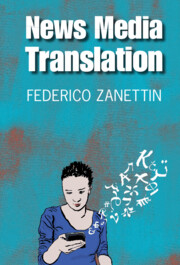Book contents
- News Media Translation
- News Media Translation
- Copyright page
- Contents
- Figures and Table
- Acknowledgments
- Introduction
- 1 Putting News Media Translation into Perspective
- 2 Translation as News
- 3 Approaches to News Media Translation
- 4 Ethnomethodology and News Media Translation
- Conclusion
- Appendix A
- References
- Subject and Name Index
Conclusion
Published online by Cambridge University Press: 29 October 2021
- News Media Translation
- News Media Translation
- Copyright page
- Contents
- Figures and Table
- Acknowledgments
- Introduction
- 1 Putting News Media Translation into Perspective
- 2 Translation as News
- 3 Approaches to News Media Translation
- 4 Ethnomethodology and News Media Translation
- Conclusion
- Appendix A
- References
- Subject and Name Index
Summary
Translation plays a fundamental role in the daily production, dissemination, and consumption of information in the news media, as shown by the wide range of inter- and multidisciplinary approaches that are currently brought to bear on the study of translation in the news media, spanning fields such as translation studies, linguistics, journalism, and media studies. I have examined key issues and concepts related to the translation of information in the light of discussions of the concept of translation from historical, theoretical, and descriptive perspectives, as well as of the current social and technological news media environment. News media translation challenges traditional approaches to translation that adopt a dichotomic opposition between source and target. As noted by Kothari (2014, p. 96) “[t]he fundamental paradigm of a ‘source’ in both language and text also arises from a certitude that boundaries of a language and text are definable and sealed, and that translation as well as original compositions are necessarily in the written tradition.” The concept of translation is historically determined and tied to material culture and is being redefined as digital technologies and globalization accompany the transition of news translation from print to screen culture. At a time when linguistic and cultural identities are renegotiated, and national identities are simultaneously dissolved by digital communication and migration flows and reaffirmed by neo-nationalist forces (Eger & Valdez 2015), the practices of news translation blur the boundaries between intralingual and interlingual translation, as digital convergence blends them with those of intersemiotic translation.
- Type
- Chapter
- Information
- News Media Translation , pp. 185 - 187Publisher: Cambridge University PressPrint publication year: 2021

